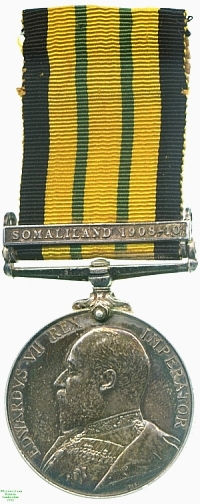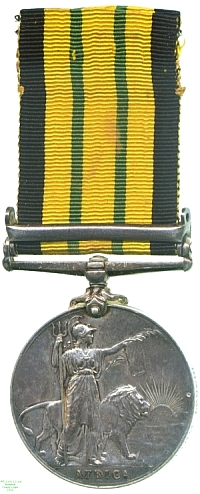
Obverse, a bust of King Edward VII facing left

Reverse, Britannia with a lion, gesturing right towards the sun on the horizon

Obverse, a bust of King Edward VII facing left |

Reverse, Britannia with a lion, gesturing right towards the sun on the horizon |
Numerous actions in the British-controlled parts of Africa were felt to merit the award of a medal, but not a distinct one for every action. The Africa General Service Medal replaced the East and West Africa Medal which had previously been awarded for service in this theatre. Bars were awarded for a variety of small campaigns, sometimes only one expedition and sometimes rather more complex operations.
The repeated uprisings in what is now Somalia led by Sayyid Mohammed Abdullah Hassan, whom the British called `the Mad Mullah', were perceived as threats not just by the British Empire, but Italy and the Ethiopian Empire also. Operations were begun against Sayyid Mohammed and his army of so-called Dervishes in 1901 by forces of all three states, with only scant success. A campaign of 1902-1904 was more effective and drove Sayyid Mohammed and his followers into Majeerteen territory in what is now the north-east of Somalia and the north-west of Ethiopia. Here they were able to hold out, although renewed campaigning by the British in 1908-1910 caused a substantial portion of the Mullah's followers to desert him. He would nonetheless remain a thorn in the British and Ethiopian sides which could not be entirely removed until his death of influenza in 1921.
This medal was awarded to Able Bodied Seaman P. Redmond, who served aboard the 3rd-class cruiser HMS Proserpine in the 1908-1910 campaign. It is one of two medals that were awarded to him that are now in the Watson Collection; the other follows. The medals are not attached to each other so although the Watson Collection catalogue considers them as Group 4 they have been treated separately here. Nonetheless, it was as a group that Lester Watson purchased them from the London dealer Spink, in 1926.